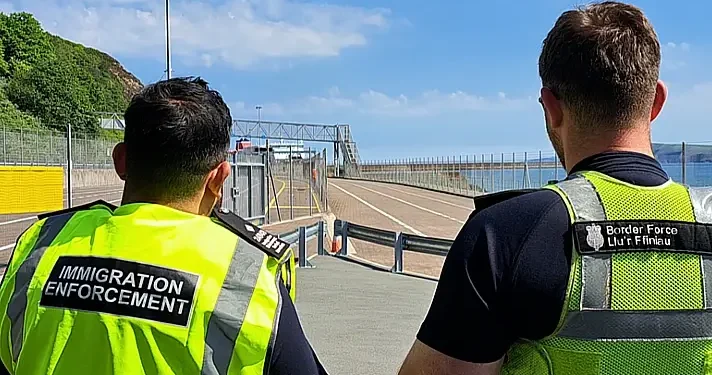A recent Home Office operation targeting people-smuggling gangs exploiting the Common Travel Area (CTA) has led to 33 arrests across Northern Ireland, North West England, and Wales.
This crackdown reflects the UK government’s intensified efforts to secure borders and dismantle criminal networks profiting from illegal immigration, impacting law enforcement, businesses, and communities.
Operation Overview
The Home Office’s latest operation against people-smuggling gangs resulted in 33 arrests across Northern Ireland, North West England, and Wales.
This multi-agency effort involved collaboration with the Police Service of Northern Ireland, An Garda Síochána, the National Crime Agency, Border Force, and other partners.
The operation also saw the seizure of £17,000 in suspected criminal assets and a heavy goods vehicle linked to a £144,000 unpaid civil penalty.
This initiative marks the sixth such operation since July 2024. It highlights a significant increase in enforcement visits and arrests targeting people-smuggling networks.
The crackdown is part of broader efforts to combat CTA abuse and reflects a 38% rise in enforcement activities aimed at dismantling these criminal networks.
The Effect on Communities
The operation aims to enhance public safety by reducing organized crime linked to people smuggling. For migrants at risk of exploitation, this means increased protection measures.
However, individuals involved in transport or travel near border areas might experience more rigorous inspections and potential delays due to heightened security measures.
Communities benefit from reduced illegal border crossings as nearly 30,000 individuals without the right to remain in the UK have been returned under current government policies.
This represents a 23% rise in enforced returns compared to previous years.
Consequences for Businesses
- Transport companies may face stricter compliance checks due to increased enforcement activities.
- Financial penalties for non-compliance could impact commercial transport businesses significantly.
- The detention of vehicles linked to unpaid civil penalties highlights financial enforcement as a key tactic against smuggling networks.
Legal Reforms and Future Challenges
The Border Security, Asylum and Immigration Bill introduces new counter-terror style powers designed to disrupt organized immigration crime effectively.
These legal reforms aim to strengthen border security while balancing robust enforcement with humane treatment of migrants.
Potential Outcomes
- Increased use of technology and intelligence-sharing may pre-empt illegal crossings more effectively.
- Sophisticated smuggling networks exploiting legal travel frameworks like the CTA remain challenging targets for law enforcement agencies.
- The ongoing challenge for UK policymakers is maintaining CTA freedoms while ensuring robust border security measures are upheld.
Additional Reading
Bottom Line
This recent crackdown underscores the UK’s commitment to securing its borders through collaborative efforts with Irish authorities.
While challenges persist in dismantling sophisticated smuggling networks fully, ongoing legal reforms aim to balance robust border security with humane treatment of migrants—ultimately enhancing public safety across communities affected by illegal immigration activities.
More of Todays Top Breaking Government News Stories!
Sources: UK Government, Migration Observatory (University of Oxford), Home Office, Dame Angela Eagle DBE MP and The Rt Hon Yvette Cooper MP.
Prepared by Ivan Alexander Golden, Founder of THX News™, an independent news organization delivering timely insights from global official sources. Combines AI-analyzed research with human-edited accuracy and context.









